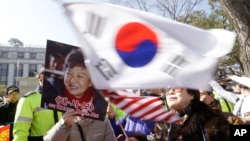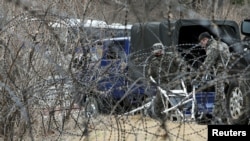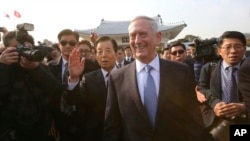The political turmoil in South Korea over the impeachment of President Park Geun-hye is exposing a sharp division in the country over national security policy, with conservatives who solidly support the U.S. alliance and progressives who want to maintain friendly ties with China.
Park has been suspended from office while the Constitutional Court reviews the impeachment motion that was passed in December by the National Assembly. Allegations that the president and a close friend secretly schemed to trade political favors for multimillion-dollar donations lie at the heart of the scandal that prompted this political crisis.
The court is expected to soon rule on the impeachment, and if upheld a new presidential election would be scheduled within 60 days. If the court strikes down the impeachment, the election will be held at the end of this year as Park’s single five-year term ends in early 2018.
While allegations of government corruption have triggered the current crisis, the political debate has evolved to include the North Korean nuclear threat as well.
THAAD
During Korea’s Independence Day on Wednesday, Park’s allies and opponents held competing demonstrations in Seoul’s Gwanghwamun Square separated by 16,000 police and more than 100 buses.
For many protesters at the pro-impeachment rallies, opposing Park also means opposing her hard-line approach to dealing with North Korea, which they say has failed to slow Kim Jong Un’s resolve to increase his country’s nuclear and ballistic missile capability.
In the last year, North Korea conducted two nuclear tests and multiple missile launches, in defiance of increased international sanctions.
Many oppose the controversial U.S. THAAD missile defense shield that the Park administration agreed to deploy and Acting President and Prime Minister Hwang Kyo-ahn continues to support.
Beijing has strongly denounced THAAD as an unnecessary and provocative military escalation that also poses a potential threat to China.
China is reportedly increasingly retaliating against South Korea by informally putting limits on imports and tourism. The Lotte Group, the Korean conglomerate that is providing the land where the THAAD will be deployed, saw a massive project in China’s northeastern city of Shenyang put on hold in December and was recently fined 44,000 Chinese yuan for violating Chinese advertising laws.
Many anti-Park activists say the potential military advantage of THAAD is not worth the growing tension it is causing with China.
“South Korea is caught in the middle and it cannot do anything. But many of us are against the deployment of THAAD,” said one protester at Wednesday’s rally.
Pro-American
The pro-Park rallies have been growing significantly in number in the last few weeks as hard-line conservatives downplay the corruption allegations and emphasize their stance on national security and sovereignty.
At their demonstrations, many of the president’s supporters wave American flags to show solidarity with the U.S., and to denounce attempts by Beijing to purportedly pressure the South Korean government to withdraw its support for THAAD.
“China is not our friend or ally. Because China is a close ally to our common enemy. We are against any Chinese attempt to intervene in any decision making process on the Korean peninsula,” said Chulhong Kim, a conservative activist and associate professor at the Presbyterian College and Theological Seminary in Seoul.
Presidential candidates
Many in the two political protest camps see the THAAD debate as a clear policy choice between embracing the strong military alliance with the United States or to side with China and take a less confrontational stance with North Korea to restart dialogue and reduce tensions.
However, the potential South Korean presidential candidates from the three largest political parties all hold somewhat moderate positions.
Acting President Hwang has come out strongly in favor of THAAD as a “vital defense measure” but said his government for now will try to resolve its differences with China through negotiation. Hwang is considered a possible conservative candidate for the ruling Liberty Korea Party that recently changed its name from the Saenuri Party in an attempt to disassociate itself from the presidential corruption scandal.
Moon Jae-in, the frontrunner candidate for the main opposition Democratic Party of Korea, has voiced support for the U.S. alliance but wants to postpone a decision on THAAD until after the election, and supports reopening dialogue and cooperation with Pyongyang.
Ahn Cheol-soo, who is a candidate for the People’s Party that also supported Park’s impeachment, holds a similar position to that of the ruling party. He is also a strong supporter of the U.S. alliance and THAAD and opposes any attempt by China to coerce South Korea on national security issues.
“Even when you are really upset and angry, there are certain boundaries that you should not cross over. For that reason I am deeply concerned about the ongoing situation being caused by China,” Ahn said.
But Ahn also said Seoul does not have to choose between Beijing and Washington, but through dialogue can manage its strategic partnerships with both.
Youmi Kim contributed to this report.







